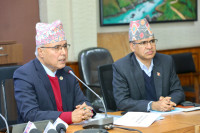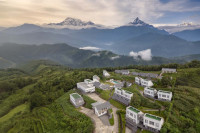Money
Nepal’s 2026 LDC exit could backfire, experts warn
Private sector urges government to seek a three-year extension, citing weak economy, political uncertainty.
Krishana Prasain
Calls are growing louder for Nepal to seek a deferment of its planned graduation from the Least Developed Country (LDC) category, as the country grapples with deep political instability, low productivity, and economic uncertainty.
On Monday, the Federation of Nepalese Chambers of Commerce and Industry (FNCCI), the apex private sector body, urged the government to formally request a reassessment from the United Nations and seek at least a three-year extension to the graduation timeline.
Speaking at an interaction organised by the National Planning Commission—the government agency responsible for national plans and policies—FNCCI President Chandra Prasad Dhakal said the government must take the lead in pursuing the extension.
Nepal is scheduled to graduate from the LDC list to a developing country in November 2026. However, amid economic vulnerabilities and the uncertainty following the September Gen Z protests, experts have increasingly called for a reassessment, saying the country is not ready for the transition.
A recent assessment by the FNCCI put the losses to the private sector from the protest vandalism at around Rs88 billion, while preliminary estimates of the total economic impact, including damage to public infrastructure and missed opportunities, run as high as Rs3 trillion.
Dhakal said that while it is a matter of national pride that Nepal is set to graduate, policymakers and planners must be sensitive to the potential fallout.
“Graduation should not be pursued at the cost of jobs and production,” he said. “The government must not make any hasty decisions under the pretext of becoming rich.”
Graduating from the LDC group entails losing several international support measures—such as preferential market access, concessional loans, and exemptions from intellectual property rules for pharmaceuticals.
Under UN rules, graduation requires meeting the thresholds on at least two of three criteria—per capita income, the human assets index, and the economic and environmental vulnerability index—across two consecutive reviews.
Nepal has never met the income criterion and is on track to become the only country to graduate without crossing the income threshold of a modest US$1,306. In the 2024 review, Nepal missed the target by just six dollars.
Even after a decade of being considered for graduation, its inability to meet the minimum income requirement underscores the economy’s deep structural weaknesses.
LDCs are typically characterised by low productive capacity, and the recent destruction of physical capital—an essential component of the UN’s productive capacity index—has further hurt Nepal’s prospects. The tourism sector, a key source of foreign exchange and employment, faces its toughest period since the pandemic.
Dhakal noted that Bangladesh has already sought a reassessment of its own graduation process.
Paras Kharel, executive director of South Asia Watch on Trade, Economics and Environment (SAWTEE), in his article “Reconsidering Nepal’s Imminent Graduation from LDC Status,” wrote that the deaths and destruction caused by the September revolution have added to the challenges of graduation.
“This warrants a reconsideration of the decision to graduate—beginning with a serious but swift discussion among stakeholders, followed by evidence-based preparation to make a strong case before the new government, which can formally seek a deferral with the United Nations,” Kharel wrote.
He added that Nepal’s per capita income growth does not reflect genuine prosperity.
“When the decision to graduate was made in 2021, we had not reached the required threshold. Even now, while we may have technically achieved the average income level, weak demand, low business morale, and sluggish performance indicate that the economy is under stress.”
FNCCI’s Dhakal warned that the private sector, particularly small entrepreneurs and women workers, would be the most severely affected by the loss of LDC-related trade privileges. “It is important to listen to those who will be directly affected,” he said, adding that the FNCCI has repeatedly drawn the government’s attention to these risks.
He also pointed out that past studies have failed to assess the impact of strict rules of origin under the South Asian Free Trade Area (SAFTA) and have not adequately examined how the two-stage production process in the ready-made garment industry would be affected.
Dhakal said that policymakers often assume Nepal will easily access trade preferences, such as the Generalised System of Preferences (GSP) or GSP Plus, in Europe.
“However, to qualify for GSP Plus, Nepal must ratify the International Labour Organisation (ILO) Convention No 87, which guarantees freedom of association and the right to strike,” he said. “Ratifying this could have complex implications for Nepal’s labour relations.”
The FNCCI, he said, has already informed the Ministry of Labour and other relevant agencies of its concerns.
Economist Pushkar Bajracharya said the timing for graduation could not be worse. “At a time when the country has suffered economic losses amounting to billions, recovery will take years,” he said. “Even if Nepal graduates, it will not make any real difference to the living standards of the people.”
Bajracharya noted that the political environment has been unstable for more than a decade, with little progress in improving economic fundamentals. “With the current growth trends, graduation is unlikely to bring positive results,” he said.
According to him, Nepal has not met all the required criteria, particularly the income target.
“Domestic production and exports have remained weak, and our products are not competitive in international markets,” he said. “Nepal continues to rely heavily on trade privileges granted to LDCs, and the economy is not yet ready to lose those benefits.”
In February 2025, just months before the unrest, Nepal was placed on the Financial Action Task Force’s (FATF) grey list, raising further concerns about its investment climate.
Economists say that attacks on businesses during the protests have inflicted lasting damage on investor confidence. Achieving graduation by 2026 will require substantial private sector investment to sustain growth, they say.
The total economic impact from September protests and vandalism estimated at around Rs3 trillion is roughly equivalent to one and a half years of Nepal’s national budget or half of its GDP—when factoring in losses to public and private infrastructure, destroyed records, job losses, and missed opportunities.




 11.12°C Kathmandu
11.12°C Kathmandu














